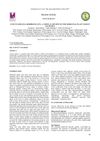 36 citations,
January 2012 in “International Journal of Trichology”
36 citations,
January 2012 in “International Journal of Trichology” Losing eyelashes or eyebrows can be a sign of many different health problems and needs a careful approach to treat effectively.
 30 citations,
August 2016 in “Advances in radiation oncology”
30 citations,
August 2016 in “Advances in radiation oncology” Researchers developed a mouse model that successfully mimics the bladder damage seen in humans after radiation therapy.
 29 citations,
May 2018 in “Clinical Endocrinology”
29 citations,
May 2018 in “Clinical Endocrinology” Recent genetic insights show that low-renin hypertension includes a range from essential hypertension to secondary or familial forms, affecting diagnosis and treatment.
 27 citations,
January 2020 in “Experimental Dermatology”
27 citations,
January 2020 in “Experimental Dermatology” Immune cells affect hair growth and could lead to new hair loss treatments.
 26 citations,
September 2018 in “Journal of Molecular Cell Biology”
26 citations,
September 2018 in “Journal of Molecular Cell Biology” Endoglin is crucial for proper hair growth cycles and stem cell activation in mice.
 26 citations,
August 2018 in “American Journal of Clinical Dermatology”
26 citations,
August 2018 in “American Journal of Clinical Dermatology” Hair loss in cancer patients can be related to the cancer itself, treatment, or other conditions, and understanding it is important for diagnosis and patient care.
 23 citations,
May 2016 in “American Journal of Pathology”
23 citations,
May 2016 in “American Journal of Pathology” The research suggests that a specific skin gene can be controlled by signals within and between cells and is wrongly activated in certain skin diseases.
 22 citations,
March 2018 in “American Journal of Clinical Dermatology”
22 citations,
March 2018 in “American Journal of Clinical Dermatology” New acne treatments show promise as alternatives to traditional therapies.
 21 citations,
July 2018 in “The Journal of Sexual Medicine”
21 citations,
July 2018 in “The Journal of Sexual Medicine” The 2018 update to the ED care model added a new severity score and stressed a detailed evaluation of both physical and psychological aspects.
 21 citations,
January 1988 in “Stress Medicine”
21 citations,
January 1988 in “Stress Medicine” Stress affects skin health and emotional well-being should be considered in skin disease treatment.
 19 citations,
August 2019 in “Expert Opinion on Therapeutic Targets”
19 citations,
August 2019 in “Expert Opinion on Therapeutic Targets” New treatments for hair loss may target specific pathways and generate new hair follicles.
 14 citations,
January 2013 in “Journal of Cutaneous Medicine and Surgery”
14 citations,
January 2013 in “Journal of Cutaneous Medicine and Surgery” Some cancer treatments can cause permanent hair loss.
 13 citations,
March 2017 in “Genomics”
13 citations,
March 2017 in “Genomics” Genomic approach finds new possible treatments for hair loss.
 13 citations,
November 2012 in “PubMed”
13 citations,
November 2012 in “PubMed” 5α-reductase inhibitors may worsen sexual drive and spontaneous erections but don't worsen existing erectile or ejaculatory problems.
 10 citations,
February 2015 in “Clinics in Dermatology”
10 citations,
February 2015 in “Clinics in Dermatology” The document concludes that changes in eyelashes and eyelid skin can indicate various local and systemic diseases.
 9 citations,
November 2018 in “Drug Discovery Today”
9 citations,
November 2018 in “Drug Discovery Today” Using skin stem cells and certain molecules might lead to scar-free skin healing.
 8 citations,
April 2020 in “Journal of Ethnopharmacology”
8 citations,
April 2020 in “Journal of Ethnopharmacology” Herbs might help with hair loss, but more research is needed to confirm their safety and effectiveness.
 8 citations,
September 2010 in “Journal of Men's Health”
8 citations,
September 2010 in “Journal of Men's Health” Androgenic Alopecia, a common hair loss condition, can be effectively treated with finasteride and other treatments.
 7 citations,
May 2014 in “Clinical practice”
7 citations,
May 2014 in “Clinical practice” Cooling the scalp may prevent hair loss from chemotherapy, hair often grows back after treatment, and nail issues usually improve after stopping the drug.
 4 citations,
December 2017 in “International journal of research in ayurveda and pharmacy”
4 citations,
December 2017 in “International journal of research in ayurveda and pharmacy” The dodder plant has anti-inflammatory, antimicrobial properties, and may promote hair growth.
 2 citations,
January 2014 in “Hair therapy & transplantation”
2 citations,
January 2014 in “Hair therapy & transplantation” New treatments for hair growth disorders are needed due to limited current options and complex hair follicle biology.
 1 citations,
July 2018 in “Elsevier eBooks”
1 citations,
July 2018 in “Elsevier eBooks” Heredity and hormones cause common hair loss, and topical minoxidil is the first recommended treatment.
 1 citations,
May 2006 in “Expert Opinion on Therapeutic Patents”
1 citations,
May 2006 in “Expert Opinion on Therapeutic Patents” No FDA-approved treatments for chemotherapy-induced hair loss existed in 2006; more research was needed.
 November 2023 in “Frontiers in cell and developmental biology”
November 2023 in “Frontiers in cell and developmental biology” Hair aging is caused by stress, hormones, inflammation, and DNA damage affecting hair growth and color.
 November 2023 in “Klìtinna ta organna transplantologìâ”
November 2023 in “Klìtinna ta organna transplantologìâ” MSC-derived exosomes can help treat COVID-19, hair loss, skin aging, and arthritis.
 June 2023 in “Dermatology and therapy”
June 2023 in “Dermatology and therapy” Doctors in the Middle East need better treatments and more knowledge about new therapies for hair loss condition Alopecia Areata.
 July 2021 in “International journal of dermatology, venereology and leprosy sciences”
July 2021 in “International journal of dermatology, venereology and leprosy sciences” Diphenylcyclopropenone is more effective and has fewer side effects than dinitrochlorobenzene for treating alopecia areata.
 June 2020 in “Journal of Dermatological Treatment”
June 2020 in “Journal of Dermatological Treatment” Use telemedicine and strict hygiene for safe hair and scalp treatments during COVID-19.
 April 2020 in “International journal of clinical and diagnostic pathology”
April 2020 in “International journal of clinical and diagnostic pathology” COX-2 and Bcl-2 proteins are involved in Lichen Planus.
 September 2019 in “Journal of Investigative Dermatology”
September 2019 in “Journal of Investigative Dermatology” Smoking and certain health conditions like thyroid disease may make palmoplantar pustulosis harder to treat.






























